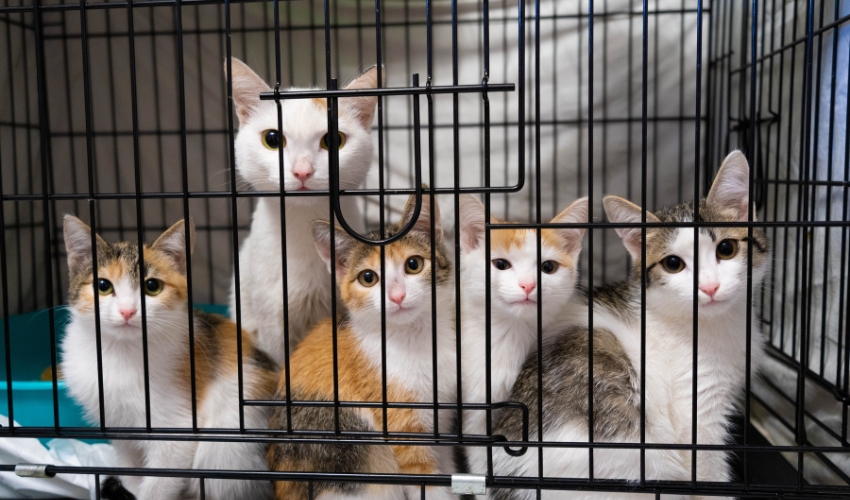Have you ever been to a rescue center for cats? You have probably already seen a cat labeled as FIV-positive.
All cat parents should be able to recognize the signs and symptoms of common illnesses that can harm their friends. Read this article to know how common is FIV in stray cats.
What Is FIV?
The Feline Immunodeficiency Virus (FIV) is a retrovirus that belongs to a group called lentiviruses. It is similar to the Human Immunodeficiency Syndrome (HIV) as it attacks and weakens the immune system, and there is no cure.
FIV is a threat to cats’ immune systems. Those infected with FIV may function normally, but they might eventually suffer from immunodeficiency, causing harmless bacteria, fungi, viruses, and protozoa to bring severe illnesses for them.
Though there is no proven cure for this disease, studies suggest that cats with FIV can live average life spans as long as they don’t have the feline leukemia virus.
How Does FIV Spread?
FIV spreads through cats’ saliva, specifically when a cat bites another cat. FIV doesn’t spread through casual and non-aggressive contact, such as cats grooming each other and sharing water bowls or litter boxes.
Cats that don’t fight a lot are at little risk of acquiring FIV infections, but this doesn’t mean that the transmission is unlikely. In rare instances, an infected mother cat may transmit the infection to her kittens.
Outdoor male cats have the highest infection rates because of their desire to fight.
How Common Is FIV In Stray Cats?
Experts in the field have conducted the FIV seroprevalence test in 3 groups of cats. 74 unowned urban strays, 20 cats from a feral cat community, and 152 client-owned cats were part of the test.
According to the study, seroprevalence for FIV was 23% in urban strays, 5.9% in client-owned cats, and 5% in the feral cat community.
How Do Veterinarians Diagnose FIV?
Vets can diagnose FIV through blood tests that detect antibodies for the virus. If lab test results turn out positive, it means that the cat already has the antibodies it needs.
What Are The Symptoms Of FIV?

Since FIV moves slowly in a cat’s system, a cat may continue living for years without showing noticeable symptoms. As soon as a cat starts showing signs of FIV, the disease can cause episodes of illnesses followed by long periods of good health.
Pet owners should take a cat to the vet if the cat starts exhibiting any of these FIV cat symptoms:
- Inflammation in the mouth and gums
- Poor coat condition
- Constant diarrhea
- Fever that keeps coming back
- Lack of appetite
- Recurrent and chronic infections in the skin, eyes, upper respiratory tract, or bladder
- Persistent eye problems
- Seizures
- Behavioral changes
- Signs of neurological disorders
Symptoms of FIV in cats may also include slow and steady weight loss. Many cats infected with this disease also develop cancer or blood disease.
What Is The Treatment And Management For FIV?
Unfortunately, there is no definite cure for FIV. However, everybody should realize that cats infected with FIV can live healthy lives for many years if managed appropriately.
When an infected feline experiences one of the severe illnesses due to infection, the prognosis is less favorable.
The most important goal for a cat diagnosed with FIV is to lessen the risk of getting secondary infections and prevent the disease from spreading to other cats. Anyone can meet these goals by keeping cats indoors and isolating them.
Spaying and neutering can eliminate the danger of spreading FIV to kittens and reduce the tendency of cats to go outside. There should be wellness visits for FIV-infected cats at least every six months.
The veterinarian will physically examine all body systems with careful attention to the health of the gums, skin, eyes, and lymph nodes. They will measure the cat’s weight accurately because weight loss is the first sign of deterioration.
The veterinarian should also perform a complete blood count test, urine analysis, and serum biological analysis annually.
Conclusion
After reading this article, you now know how common is FIV in stray cats. This is a contagious disease that can spread from one cat to another.
Always be mindful of the severe signs and symptoms of FIV to help your cat get the best treatment as soon as possible. Proper treatment from a veterinarian is the key to helping your feline get through this disease.
Do you want to rescue animals in need of a caring family? If saving lives is what you wish for, you can apply as a volunteer in Doobert. They are an online platform built for online rescuers, promoting animal welfare and giving them the loving home they deserve.











